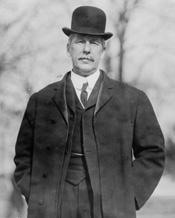Arsène Pujo | |
|---|---|
 | |
| Member of the United States House of Representatives from Louisiana's 7th district | |
| In office March 4, 1903 – March 3, 1913 | |
| Preceded by | None |
| Succeeded by | Ladislas Lazaro |
| Personal details | |
| Born | December 16, 1861 Lake Charles, Calcasieu Parish, Louisiana |
| Died | December 31, 1939 (aged 78) New Orleans, Louisiana |
| Political party | Democratic |
Arsène Paulin Pujo (December 16, 1861 – December 31, 1939), was a member of the United States House of Representatives best known for chairing the "Pujo Committee", which sought to expose an anticompetitive conspiracy among some of the nation's most powerful financial interests (trusts).
Biography
Pujo was born near Lake Charles in Calcasieu Parish to a French-born father.[1] He practiced law in Lake Charles and was a delegate to the state constitutional convention in 1898 before he was elected as a Democrat in 1902. In 1908, he became a member of the National Monetary Commission, a body which sought to study foreign banking systems in search of ways to better the domestic banking system. In 1911, he was appointed to chair the House Committee on Banking and Currency. In 1912, he left the National Monetary Commission and obtained congressional authorization to form a separate committee, which came to be called the Pujo Committee, to investigate the "money trust".
The Pujo Committee found that a cabal of financial leaders were abusing their public trust to consolidate control over many industries. Although Pujo left Congress in 1913, the findings of the committee inspired public support for ratification of the Sixteenth Amendment in 1913, passage of the Federal Reserve Act that same year, and passage of the Clayton Antitrust Act in 1914. They were also widely publicized in the Louis Brandeis book, Other People's Money and How the Bankers Use It.
While still a Congressman Pujo worked as a lumber company lawyer and helped suppress an Industrial Workers of the World (IWW) timber workers strike in 1912, which cumulated in the Grabow riot. Although the coroner charged the Galloway Lumber Company of Grabow, Louisiana with murder for shooting and killing three union strikers on July 7, 1912, the grand jury refused to indict and instead charged 58 union members with first-degree murder. Pujo helped prosecute 9 but the jury returned a dismissal after 1 hour of deliberation and the remaining defendants were released. (Perlman and Taft, p. 246) [2]:111
References
- ^ "United States Census, 1880", FamilySearch, retrieved March 29, 2018
- ^ LeJeune, Keagan (2010). Always for the underdog : Leather Britches Smith and the Grabow War (1st ed.). Denton, Tex.: University of North Texas Press. ISBN 978-1-57441-346-5. OCLC 726747555.
- United States Congress. "Arsène Pujo (id: P000567)". Biographical Directory of the United States Congress.
Sources
- Perlman, Selig and Philip Taft. History of Labor in the United States, 1896-1932. Volume IV Labor Movements. MacMillan: NY, 1935. 683 pp.
- The American Pageant 11th Edition by Thomas A. Bailey, David M. Kennedy, and Lizabeth Cohen; copyright 1998
| U.S. House of Representatives | ||
|---|---|---|
| Preceded by District created | Member of the U.S. House of Representatives from Louisiana's 7th congressional district 1903–1913 | Succeeded by Ladislas Lazaro |